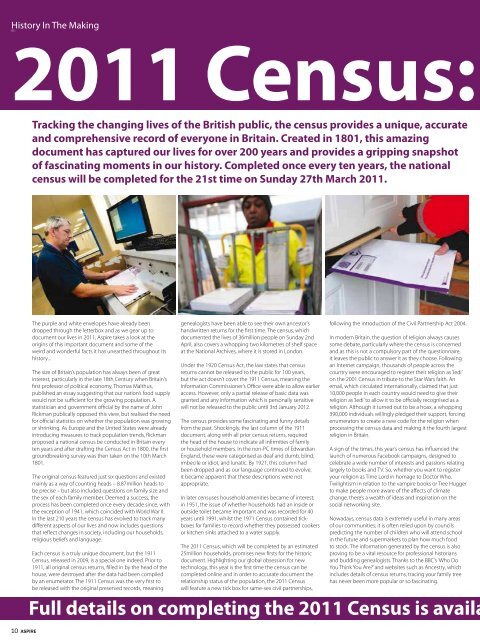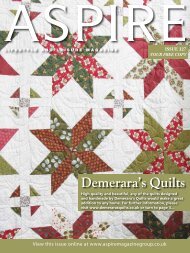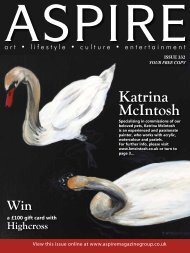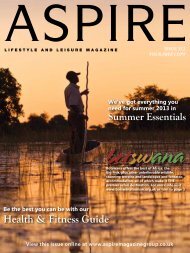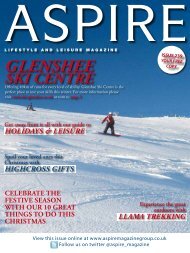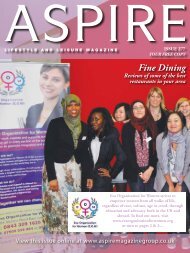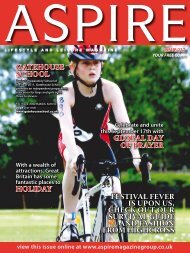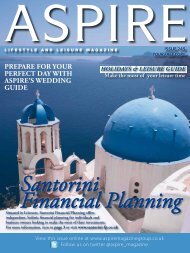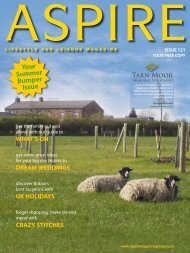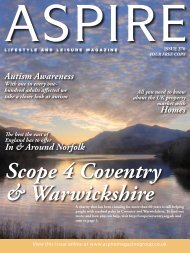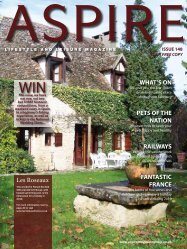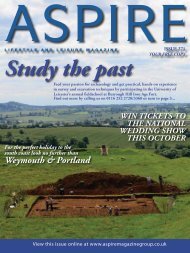ACTION HOMELESS - Aspire Magazine
ACTION HOMELESS - Aspire Magazine
ACTION HOMELESS - Aspire Magazine
You also want an ePaper? Increase the reach of your titles
YUMPU automatically turns print PDFs into web optimized ePapers that Google loves.
History In The Making<br />
2011 Census: A Snapshot Of Britain By Sarah Ross<br />
10 ASPIRE<br />
Tracking the changing lives of the British public, the census provides a unique, accurate<br />
and comprehensive record of everyone in Britain. Created in 1801, this amazing<br />
document has captured our lives for over 200 years and provides a gripping snapshot<br />
of fascinating moments in our history. Completed once every ten years, the national<br />
census will be completed for the 21st time on Sunday 27th March 2011.<br />
The purple and white envelopes have already been<br />
dropped through the letterbox and as we gear up to<br />
document our lives in 2011, <strong>Aspire</strong> takes a look at the<br />
origins of this important document and some of the<br />
weird and wonderful facts it has unearthed throughout its<br />
history...<br />
The size of Britain’s population has always been of great<br />
interest, particularly in the late 18th Century when Britain's<br />
first professor of political economy, Thomas Malthus,<br />
published an essay suggesting that our nation’s food supply<br />
would not be sufficient for the growing population. A<br />
statistician and government official by the name of John<br />
Rickman publically opposed this view, but realised the need<br />
for official statistics on whether the population was growing<br />
or shrinking. As Europe and the United States were already<br />
introducing measures to track population trends, Rickman<br />
proposed a national census be conducted in Britain every<br />
ten years and after drafting the Census Act in 1800, the first<br />
groundbreaking survey was then taken on the 10th March<br />
1801.<br />
The original census featured just six questions and existed<br />
mainly as a way of counting heads – 8.87million heads to<br />
be precise – but also included questions on family size and<br />
the sex of each family member. Deemed a success, the<br />
process has been completed once every decade since, with<br />
the exception of 1941, which coincided with World War II.<br />
In the last 210 years the census has evolved to track many<br />
different aspects of our lives and now includes questions<br />
that reflect changes in society, including our households,<br />
religious beliefs and language.<br />
Each census is a truly unique document, but the 1911<br />
Census, released in 2009, is a special one indeed. Prior to<br />
1911, all original census returns, filled in by the head of the<br />
house, were destroyed after the data had been compiled<br />
by an enumerator. The 1911 Census was the very first to<br />
be released with the original preserved records, meaning<br />
genealogists have been able to see their own ancestor’s<br />
handwritten returns for the first time. The census, which<br />
documented the lives of 36million people on Sunday 2nd<br />
April, also covers a whopping two kilometres of shelf space<br />
at the National Archives, where it is stored in London.<br />
Under the 1920 Census Act, the law states that census<br />
returns cannot be released to the public for 100 years,<br />
but the act doesn’t cover the 1911 Census, meaning the<br />
Information Commissioner’s Office were able to allow earlier<br />
access. However, only a partial release of basic data was<br />
granted and any information which is personally sensitive<br />
will not be released to the public until 3rd January 2012.<br />
The census provides some fascinating and funny details<br />
from the past. Shockingly, the last column of the 1911<br />
document, along with all prior census returns, required<br />
the head of the house to indicate all infirmities of family<br />
or household members. In the non-PC times of Edwardian<br />
England, these were categorised as deaf and dumb, blind,<br />
imbecile or idiot, and lunatic. By 1921, this column had<br />
been dropped and as our language continued to evolve,<br />
it became apparent that these descriptions were not<br />
appropriate.<br />
In later censuses household amenities became of interest;<br />
in 1951, the issue of whether households had an inside or<br />
outside toilet became important and was recorded for 40<br />
years until 1991, whilst the 1971 Census contained tickboxes<br />
for families to record whether they possessed cookers<br />
or kitchen sinks attached to a water supply.<br />
The 2011 Census, which will be completed by an estimated<br />
25million households, promises new firsts for the historic<br />
document. Highlighting our global obsession for new<br />
technology, this year is the first time the census can be<br />
completed online and in order to accurate document the<br />
relationship status of the population, the 2011 Census<br />
will feature a new tick box for same-sex civil partnerships,<br />
following the introduction of the Civil Partnership Act 2004.<br />
In modern Britain, the question of religion always causes<br />
some debate, particularly where the census is concerned<br />
and as this is not a compulsory part of the questionnaire,<br />
it leaves the public to answer it as they choose. Following<br />
an Internet campaign, thousands of people across the<br />
country were encouraged to register their religion as ‘Jedi’<br />
on the 2001 Census in tribute to the Star Wars faith. An<br />
email, which circulated internationally, claimed that just<br />
10,000 people in each country would need to give their<br />
religion as ‘Jedi’ to allow it to be officially recognised as a<br />
religion. Although it turned out to be a hoax, a whopping<br />
390,000 individuals willingly pledged their support, forcing<br />
enumerators to create a new code for the religion when<br />
processing the census data and making it the fourth largest<br />
religion in Britain.<br />
A sign of the times, this year’s census has influenced the<br />
launch of numerous Facebook campaigns, designed to<br />
celebrate a wide number of interests and passions relating<br />
largely to books and TV. So, whether you want to register<br />
your religion as Time Lord in homage to Doctor Who,<br />
Twilightism in relation to the vampire books or Tree Hugger<br />
to make people more aware of the affects of climate<br />
change, there’s a wealth of ideas and inspiration on the<br />
social networking site.<br />
Nowadays, census data is extremely useful in many areas<br />
of our communities; it is often relied upon by councils<br />
predicting the number of children who will attend school<br />
in the future and supermarkets to plan how much food<br />
to stock. The information generated by the census is also<br />
proving to be a vital resource for professional historians<br />
and budding genealogists. Thanks to the BBC’s ‘Who Do<br />
You Think You Are?’ and websites such as Ancestry, which<br />
includes details of census returns, tracing your family tree<br />
has never been more popular or so fascinating.<br />
The Census In Numbers:<br />
10 5.6<br />
size in 1801. each census.<br />
The average household The time in years between<br />
100<br />
Personal data from the<br />
census can only be released<br />
to the public a century on<br />
from its completion, so<br />
the full details of the 2011<br />
Census will not be available<br />
until 2111.<br />
35,000<br />
The number of field staff<br />
taken on to help carry out<br />
the 2011 Census.<br />
639<br />
The number of individuals<br />
with the first name<br />
Christmas, as recorded on<br />
the 1901 Census.<br />
8.87million<br />
The population of Britain at<br />
the time of the first official<br />
census, taken in 1801.<br />
36<br />
The most common age of<br />
the population ten years<br />
ago, according to statistics<br />
from the 2001 Census.<br />
1,000<br />
The maximum amount in<br />
pounds you can be fined<br />
for not filling in the 2011<br />
Census.<br />
482million<br />
The estimated cost of the<br />
2011 Census.<br />
Full details on completing the 2011 Census is available at www.census.gov.uk<br />
43<br />
The number of questions<br />
relating to the individual,<br />
including language, work<br />
habits and health.<br />
58,789,194<br />
The population at the time<br />
of the 2001 Census.<br />
8,560<br />
The number of individuals<br />
who were 100-years-old or<br />
over in 2001.<br />
The Times They<br />
Are A Changin’<br />
A lot can change in a decade; from great<br />
sporting achievements to tragic events, <strong>Aspire</strong><br />
takes a look at the major events that have<br />
marked the last ten years...<br />
2001<br />
The biggest attack on<br />
American soil, 9/11 left<br />
almost 3,000 people from<br />
more than 90 countries<br />
dead, including 67 Brits.<br />
2003<br />
England narrowly beat<br />
Australia in the 2003 Rugby<br />
World Cup Final thanks<br />
to Johnny Wilkinson’s last<br />
minute drop kick goal.<br />
2005<br />
Four bombs were<br />
simultaneously detonated<br />
on London’s public<br />
transport system on the 7th<br />
July, killing 52 and injuring<br />
nearly 800.<br />
2007<br />
Harry Potter and the<br />
Deathly Hallows, the<br />
seventh and final book in<br />
JK Rowling’s fantasy series,<br />
became the UK’s fastest<br />
selling book, with more<br />
than one household in ten<br />
buying their copy within<br />
the first 24 hours.<br />
2009<br />
Britain’s Got Talent star and<br />
YouTube sensation Susan<br />
Boyle made chart history<br />
when ‘I Dreamed A Dream’<br />
became the fastest selling<br />
debut album in the UK.<br />
2002<br />
In the year of her Golden<br />
Jubilee, the Queen suffered<br />
much sadness following the<br />
deaths of Princess Margaret<br />
and the Queen Mother.<br />
2004<br />
Passed on the 18th<br />
November, the Civil<br />
Partnership Act 2004<br />
signalled a major win in the<br />
fight for gay rights.<br />
2006<br />
The threat of bird flu caused<br />
fear when a dead swan<br />
found in Scotland tested<br />
positive for the H5N1 strain<br />
of the virus.<br />
2008<br />
As many of us are still<br />
feeling the effects, we<br />
hardly need reminding that<br />
the UK’s worst financial<br />
crisis for 20 years began<br />
during 2008.<br />
2010<br />
Starting and ending with<br />
extremes of the sub-zero<br />
variety, 2010 started with<br />
the longest cold snap for<br />
30 years and ended much<br />
the same.<br />
ASPIRE 11


